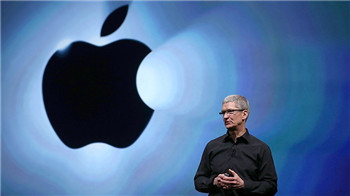(单词翻译:单击)

The uproar about Google paying 130m in back taxes and raising the amount it pays in the UK by just 10m a year is merely a little local difficulty compared with what comes next. Apple could soon be instructed to pay billions, triggering a showdown between Europe and the US and a potential breakdown of the international tax system. This sounds apocalyptic but it is a decent bet.
谷歌(Google)在英国补缴1.3亿英镑税款并将其在英国的纳税额一年提高区区1000万英镑,这件事引发的喧嚣与接下来将要发生的事相比不过是小巫见大巫。苹果(Apple)很快可能被要求支付数十亿美元的税款,这将导致欧洲与美国之间的摊牌,并有可能引发国际税收制度的崩溃。听上去像是世界末日,但这是一个胜算不错的押注。
If you doubt it, consider the following. From irate taxpayers and infuriated politicians to defiant bosses of multinationals, many are at the ends of their tethers about corporate tax. Countries in the Organisation for Economic Co-operation and Development have spent two years trying to fix the system; one of the first results, Google’s UK deal, has gone down terribly.
如果你有所怀疑,不妨考虑以下现实。从愤怒的纳税人、怒不可遏的政客到跨国公司的不买账老板,很多人都被企业税问题搞得焦头烂额。经合组织(OECD)国家花了两年时间试图理顺这一制度;首批成果之一——谷歌在英国达成的协议——引发的反响糟糕透顶。
Apple disclosed on Tuesday that its minimally taxed pot of overseas cash has grown to $200bn. Tim Cook, chief executive, flew to Brussels last week to protest at the likelihood of being told by the European Commission to pay a chunk to Ireland, where it has operated since 1980. American politicians are angry at what some call “a direct threat to the interests of the US”.
苹果最近披露,其千方百计避税的海外资金库已经扩大至2000亿美元。苹果首席执行官蒂姆錠克(Tim Cook)最近飞往布鲁塞尔,抗议该公司有可能被欧盟委员会(European Commission)要求向爱尔兰(苹果自1980年起一直在该国经营)支付大量税款。美国政客对某些人所称的“对美国利益的直接威胁”大为震怒。
The question on which the future of global tax harmony rests is not whether Google should pay more in the UK and less in Ireland. It is whether US multinationals pay much tax anywhere on overseas earnings, and whether they ever will. For now, billions in profits are booked in Bermuda and offshore entities, annoying everyone.
就全球税收协调的未来而言,关键问题并不在于谷歌是否应该在英国缴纳更多的税款,而在爱尔兰少缴些税款,而是在于美国跨国公司是不是要在任何地方为海外利润支付可观税款?以及他们会不会这样做?目前,巨额利润被计入百慕大之类地方的离岸实体,令各方恼火。
The centre is not holding for Alphabet, Google’s parent group, as France and Italy reinterpret their laws to make it pay more tax before local profits escape to Ireland and then, via the Netherlands, to Bermuda. It will surely fracture over EU cases against Apple and Amazon since the US lives in hope that one day, over the rainbow, their cash will come home to be taxed.
随着法国、意大利重新解释本国法律,以便迫使谷歌在把当地实现的利润转移至爱尔兰(然后经由荷兰转移至百慕大)之前缴纳更多税款,对谷歌的母公司Alphabet来说,局面难以为继。欧盟对苹果和亚马逊(Amazon)采取的行动肯定会搅乱现状,因为华盛顿方面一直期盼着,有一天这些企业海外小金库中的资金将会“跨越彩虹”回到母国,让政府斩获可观税款。
We face a historic moment. The tax system formed under the League of Nations in 1928 relies on the idea that companies should be taxed largely where profits are created, not where they sell their products and services. It could soon fall apart and what happens then is anyone’s guess, although it will not be pretty and will probably resemble a global tax war.
我们面临一个历史性的时刻。1928年在国联(League of Nations)主导下形成的税收制度依赖于这样一种理念,即企业应当在创造利润的地方缴纳大部分税款,而非在出售产品和服务的地方。这一制度可能很快就会瓦解,没人知道之后会发生什么,尽管局面不会好看,很可能像是一场全球税收战争。
Multinationals, especially US corporations subject to America’s dysfunctional tax laws, stretched rules to the point where the result appals taxpayers. They did so with the aquiescence of offshore havens and countries such as Ireland and Luxembourg.
跨国公司——尤其是受制于功能失灵的美国税法的美国企业——钻法律空子的程度,对纳税人来说简直骇人听闻。他们之所以能够这么做,是因为有了海外避税天堂以及爱尔兰、卢森堡等国的配合。
The European taxpayer in the street might just credit the idea that Alphabet or Apple create, design and manage their products and services from California, and so the US should receive a larger share of its profits than Italy or the UK. This is the intended outcome of international tax treaties.
大街上的欧洲纳税人或许会接受这样的观念:既然Alphabet或苹果在加利福尼亚创造、设计和管理自己的产品和服务,因此,美国应该得到比意大利或英国更大的利润份额。这正是国际税收条约意欲达到的结果。
Why, though, should he or she accept that intellectual property can be shifted to any convenient spot, according to which jurisdiction levies the least tax? Google’s search engine was not invented in Bermuda and Apple did not develop the iPhone in a tax-advantaged entity sitting between Ireland and the US. Such structures obey the letter of the law but they are nonsensical.
不过,他或她为什么应该接受另一种观念:知识产权可以转移到任何便利的地方,就因为那个司法管辖区征收的税率最低?谷歌的搜索引擎不是在百慕大开发的,苹果也不是在坐落于爱尔兰与美国之间的一个享有税收优势的实体开发iPhone。这种税收结构符合法律条文,但它们是荒谬的。
They exist to hold what is in theory a US tax liability until Congress gets around to cutting the US corporate tax rate from 40 per cent (including federal and state taxes) and luring the cash back. Yet the chance of Apple repatriating the entire $200bn is slim; some of it will never return, being invested instead in overseas expansion.
它们的存在是为了持有理论上的美国纳税义务——直至美国国会采取行动降低美国高达40%的企业税率(包括联邦和州税收),把资金吸引回来。然而,苹果将其全部2000亿美元资金汇回美国的可能性很小;其中一部分永远不会回到美国,而将被投资于海外扩张。
Mr Cook would leap out of his chair to protest at this point. These were and are the rules, he would say. By all means change them but do not impugn Apple’s honour by calling it a tax dodger or raiding its coffers retrospectively for alleged underpayments going back a decade. The EU should not use the device of state aid rules to interfere in Ireland’s right to set corporate tax rates.
在这一点上,库克可能会从椅子上跳起来表示抗议。他会说,过去和现在实行的都是这些规则。立法机构可以想尽办法改变它们,但不要损害苹果的声誉——称其为逃税者,或者打苹果所持现金的主意,在回溯性基础上追讨长达10年的据称的欠税。欧盟不应把国家补助规则用作工具,干涉爱尔兰设定企业税率的权利。
Well, perhaps. Without attributing malice to Steve Jobs, both Apple, the company he co-founded, and Ireland were pretty ingenious about tax; they can hardly complain if Margrethe Vestager, EU competition commissioner, is ingenious in return. As to Apple’s complaint of retrospective legislation, the Supreme Court often strikes down US state laws long after they were passed, no matter how inconvenient it is for anyone who is affected.
好吧,也许如此。在不说苹果联合创始人史蒂夫吠布斯(Steve Jobs)坏话的前提下,苹果和爱尔兰在税收方面都颇有独创意识;如果欧盟竞争事务专员玛格丽特维斯特格(Margrethe Vestager)也拿出独创意识,他们没什么可抱怨的。至于苹果对有追溯效力法规的不满,美国最高法院经常在州法律通过后很久将其推翻——不论这样做对受影响的人造成多大麻烦。
The US Treasury is lining up on its companies’ side. It worries about taxpayers footing the bill in forgone tax receipts if more is taken by European countries. The Senate finance committee wants it to consider retaliating by double taxing European companies if billions are bitten from Apple.
美国财政部站在美国公司的一边。它担心,如果欧洲国家拿走更多的税款,美国纳税人将为打水漂的税收收入买单。参议院财政委员会希望财政部考虑进行报复——如果苹果被“咬掉”巨额税款,就对欧洲企业进行双重征税。
The incentive to carry on co-operating is slim. The UK tax authorities tried to raise Google’s bill while still treating its British arm as a minor contributor to global profits — a plausible view under revised OECD guidelines. They are now in disgrace for not being tough enough while France and Italy, which have changed tack to enforce far higher local taxes, bask in approval.
继续合作的动力不大。英国税务当局试图提高谷歌的纳税额,同时仍将其英国子公司视为全球利润的较小贡献者——根据经合组织的修订版指引,这是一种合理的观点。他们如今受到诟病,被指态度不够强硬,而改变策略、执行更高地方税的法国和意大利受到广泛赞赏。
It is clear where this ends. When the global tax consensus cannot hold, it is every nation for itself. This was what they tried to remedy in 1928 but the goodwill is fading fast.
这一切的结局很明显。当全球税收共识无法维持时,各国将只顾自己的利益。这正是他们在1928年试图补救的情况,但诚意正在快速消退。


